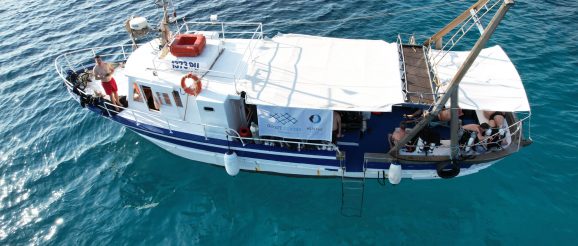Premuda, Croatia: Where history meets conservation and innovation

During Ghost Diving Adriatic’s latest ghost net cleanup project, a team of 8 divers headed to Premuda island from July 24-27, to clean up 3 shipwrecks lying at 60-65 meters depth, covered in old fishing nets.
Divers from all over the world are frequently visiting these wrecks to explore their fascinating history. The volunteers of Ghost Diving are explorers too, but they are also conservationists. Their mission is to preserve the ocean and sea life. Thanks to Healthy Seas and the support from our partners, the team was able to remove over 850 meters of long lines and gill nets that were endangering the environment and biodiversity, this way making the surrounding Adriatic Sea a safer habitat.
The Wrecks
A 100-meter merchant ship sunken by hitting a mine during WWII. Diving depth was between 50 and 60 meters. It has two larger gill nets stuck on it.
It is a German corvet sunken 12 miles west of Premuda island during WWII. The shipwreck is lying in one piece on the port side. Diving depth is from 57 to 65 meters. The wreck is covered with two trawling nets.
SS Pelagosa
A 50-meter-long wreck sunken 3 miles west of Premuda island. Pelagosa was torpedoed by an Italian submarine during WWI. The team also cleaned Kathedral reef from several hundred meters of gill nets.
Why Wrecks
Wrecks provide excellent habitats for marine life, acting as a reef and providing shelter. At the same time, it is on wrecks that fishing nets get most often snagged. These two facts combined means that there is an increased possibility of finding trapped marine life around wrecks.
Innovation
All retrieved nets were transported back to Krnica, where Ghost Diving Adriatic’s operations are based. In the Healthy Seas story, waste is not the end of a product’s life cycle, but the springboard for sustainable product design. The nylon fishing nets will be regenerated together with other nylon waste by Aquafil into ECONYL® yarn, the basis for new products such as socks, swimwear, carpets and accessories. Other types of plastics will also be reused or recycled.
The post Premuda, Croatia: Where history meets conservation and innovation appeared first on HEALTHY SEAS.
